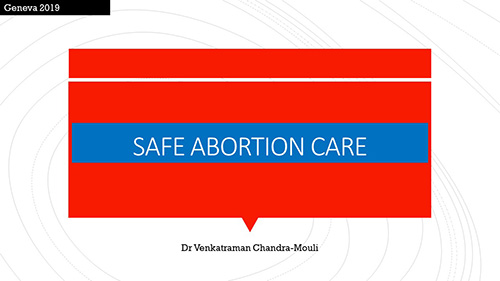Adolescent sexual and reproductive health - Course files
Safe abortion care
Venkatraman Chandra-Mouli
Training course in adolescent sexual and reproductive health 2019
September 30, 2019 - Geneva
Download the complete document
Chandra-Mouli V. Safe abortion care. Paper presented at: Training course in adolescent sexual and reproductive health; 2019 Sep 30; Geneva.
Tasks
- Go over the slide set and talking points titled: Safe abortion care (Safe abortion care with talking points). It contains key messages from the WHO publication: WHO recommendations on adolescent sexual and reproductive health and rights (2018).
- Go over the journal paper titled: Johnson BR, Mishra V, Lavelanet AF, Khosla R, Ganatra B. A global database of abortion laws, policies, health standards and guidelines. Bull World Health Organ. 2017 01;95(7):542-4.
- Go over the journal paper titled: Lavelanet AF, Johnson BR, Ganatra B. Global Abortion Policies Database: A descriptive analysis of the regulatory and policy environment related to abortion. Best Pract Res Clin Obstet Gynaecol. 2019 Jun 26.
- Consult related pages of the following reading materials:
- A WHO publication titled: Safe abortion: technical and policy guidance for health systems. Geneva: WHO, 2012.
- A WHO document titled: Medical Management of Abortion. Geneva: WHO, 2018.
Reference document
Assignment
Answer the following four questions using use the clues to review the selected aspects of the relevant documents.
Question 1
1.1 What is the difference between less safe abortion and least safe abortion?
2 marks
1.2 Why is this distinction important?
2 marks
Clue: Study page 26 of the WHO publication titled: WHO recommendations on adolescent sexual and reproductive health and rights (2018).
Question 2
What are WHO’s recommendations on the regulatory, policy and human rights aspects of abortion?
2 marks
Clues:
(1) Study page 2 of the paper titled: A global database of abortion laws, policies, health standards and guidelines (Johnson BR et al, 2017).
(2) Box 7 in page 9 of the WHO publication titled: Safe abortion: technical and policy guidance for health systems (Geneva, 2012).
Question 3
3.1 What is the global abortion policies database? What is its objective?
4 marks
Clue: Study page 1 of the paper titled: A global database of abortion laws, policies, health standards and guidelines (Johnson BR et al, 2017).
3.2 Drawing from an analysis of the Global database of abortion laws, policies, health standards and guidelines, what is the situation in terms of parental/spousal globally?
3 marks
Clue: Study page 5 in the journal paper titled: Global abortion policies database: A descriptive analysis of the regulatory and policy environment related to abortion (Best Practice and Research Clinical Obstetrics and Gynaecology).
3.3 What – in your opinion – is the ideal policy and practice in relation to parental/spousal consent for abortion? Please explain your answer.
4 marks
Question 4
4.1 An 19 year-old girl has decided after counselling to have a medical abortion for an unintended pregnancy of 12 weeks. What is the WHO recommended medical abortion regimen in this situation?
4 marks
Clue: Study pages xi and 25 of the WHO document titled Medical Management of Abortion (WHO, 2018).
4.2 To prevent a repeat unintended pregnancy, when could this young woman be recommended an oral contraceptive?
4 marks
Clue: Study pages xi and 32 of the WHO document titled Medical Management of Abortion (WHO, 2018).
Best assignments of week 4: Safe abortion care
Congratulations to the following participants whose assignments have been chosen as the best assignment of week 4 by their coaches. Click on the participant’s name to read the assignment.
Agnes Mandela Angolo, Concern World Wide, Nairobi, Kenya
Coach’s comment
"You are an enthusiastic and determined learner with gradual improving trends. you have concisely and correctly addressed the questions. You have showed proof of your in-depth studies into the supplied materials and balanced thematic opinions. You are adherent to the structure and formatting guidelines." Ashim Roy, GFMER country coordinator and course tutor
Franklin Onukwugha, University of Hull, United Kingdom
Coach’s comment
"I appreciate the efforts of all the participants this week. It was interesting and enlightening to read your opinions and explanations on what an ideal policy for parental and spousal consents for abortion should be. This assignment was chosen as the best for the week because the depth to which the questions were addressed shows that the participant studied the module materials in great details and understood the concept. Moreover, he researched the topic and provided additional evidence in support of his responses. Areas to improve on will be to ensure his answers are more concise and better paraphrased." Raqibat Idris, GFMER course coordinator and tutor
Maryam Muhammad Zakari, Federal Staff Hospital, Gwarinpa. Abuja, Nigeria
Coach’s comment
"The participant's responses clearly shows an ability to access, review and understand all relevant source material. Also indicates a skill in drawing analogies to existing situations in referenced countries." Aishatu Abubakar-Sadiq, GFMER country coordinator and course tutor
Nana Zulu, Options Consultancy Services, Lusaka, Zambia
Coach’s comment
"Our team have, indeed, excelled this week. Most of participants were almost perfect! Yet, our colleague, Nana, accomplished with superior ability, good effort, and great courage. Congratulations Nana!" Khadija Ahmed Matrook, GFMER country coordinator and course tutor
Sneha Siddham, Plan International India, New Delhi, India
Coach’s comment
"I would like to nominate Sneha Siddham for the fourth week of the course." Lela Shengelia, GFMER country coordinator and course tutor
Zaituna Asio, Plan International Uganda, Kampala, Uganda
Coach’s comment
"From her paperwork assignment, Zaituna demonstrated an excellent understanding of the contents of module 4-Safe Abortion Care and she has read the recommended materials and references. She understood and addressed all the assignment questions effectively, except her response on question no. 1.2 could be better. The responses are well articulated and she tried to relate and compare some abortion issues with the current situation in her home country. As usual, I greatly appreciate the commitment and effort of all the participants despite their routine jobs and additional family responsibilities." Melaku Samuel Hottessa, GFMER course tutor
